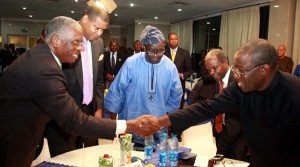
L-R: Senior Fellow and Director, Centre for Leadship in Journalism, Pan-African University, Mr. Richard Ikiebe; Executive Director, Apostles in The Market Place (AiMP), Pastor John Enelamah, Chief of Staff, Office of the Executive Secretary, Economic Commission for Africa, Mr. Adeyemi Dipeolu; former Attorney General and Commissioner for Justice, Lagos State, Professor Yemi Osinbajo; with Special Guest of Honour and Ekiti State Governor, Dr Kayode Fayemi, during the Annual Partners Dinner of the AiMP, in Lagos.
Ekiti State Governor, Dr. Kayode Fayemi has urged Christians not to shy away from holding political offices; saying that politics, contrary to the opinion of many, is not a dirty game.
Speaking at a forum in Lagos on “Christians in Politics: The Challenge of Transformative Public Engagement”, the Governor said the view that Christians should disengage from holding political offices takes its roots in the nation’s political experiences characterised by greed and corruption rather than any actual scriptural principle.
The event was put together by a group of young Christian professionals- Apostles in the Market Place (AiMP)
Dr. Fayemi stressed that in as much as Christians believe that civil authority is an agency divinely instituted to promote justice and order in society, politics, which is the operation of that agency, becomes necessary. He, however, added that politics is a noble vocation but it may be tainted by the frailties of its practitioners.
He asserted that Christians had an investment in the very foundations of Nigeria that was “far more than tangential” and should therefore contribute their quota in ensuring that social justice prevails in the nation that is currently entangled by corruption and other social vices.
Governor Fayemi stressed that as citizens of the kingdom of God, Christians have a responsibility to bring “transcendent standards of righteousness and justice to bear upon the institutions that shape our earthly lives”.
The Governor said: “When we venture into the public square, we have a responsibility to establish accurate patterns of due process, accountability and public policy. Sound fiscal policy is righteousness. These enhance the quality of governance and transform socio-political institutions and structures. One example of how my Christian faith has influenced my governance pattern can be seen from how my administration structured our social security scheme.”
Quoting the late sage, Chief Obafemi Awolowo, the Governor stated that the agencies of Politics and Religion must work in close and harmonious co-operation since the duo share the goal of eradicating ignorance, disease and want.
While stating that the role of Christians in politics is not to impose a Christian theocracy, Governor Fayemi explained that the Christian in public office is there for the good of all citizens regardless of their beliefs “and the legitimacy of his leadership rests not on his selective advancement of the cause of his creed but on his ability to manage collective aspirations and resources for the betterment of all the citizenry”.
“Our understanding of politics must not be restricted to the pursuit of votes in election season. Christian public engagement is about confronting the forces that limit our ability to enjoy a full and creative life. Once we step into the public domain to pursue the common good rather than individual ends, we are already in politics; whether we take to social entrepreneurship, philanthropy, non-profit work, political activism, advocacy, or legal aid, etc – any endeavour that takes us out of the comfort zones of our own needs into the terrain of collective concern makes us political actors. The calling will entail different pursuits for each of us”, he asserted.
Speaking on the paradox of religion in Nigeria, Governor Fayemi stated that the social, economic and political realities of the nation provide a sobering portrait against the backdrop of the spiritual boom it has witnessed with the proliferation of churches.
He expressed worry that though the economy is growing but not fast enough to absorb the host of jobseekers who graduate each year; adding that the link between unemployment and social chaos is obvious considering the severe incidents of conflict, insecurity and terrorism in Nigeria.
Dr. Fayemi said there is evidence that the Nigerian society is contemptuous of rules and order, and that as a people Nigerians no longer have any regard for the norms of civility and mutual respect as all that matters seems to be the individual’s quest to get ahead at any cost.
Many young people, he said, are entranced by the possibilities of upward mobility inherent in fraud and a variety of get-rich-quick schemes that reflect our societal bias for instant gratification while others have been initiated into terrorism and political violence.
Last modified: February 22, 2013
